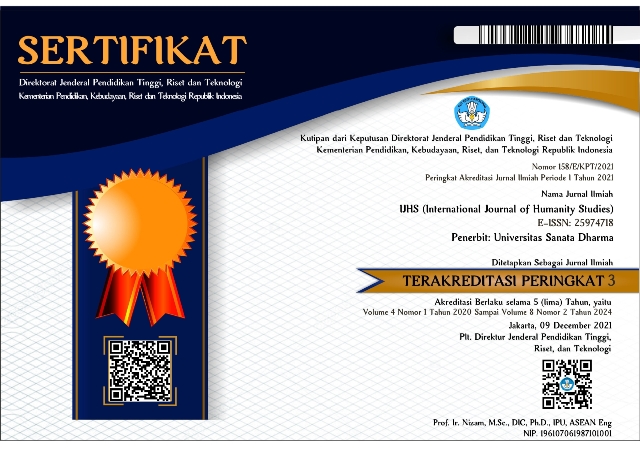EVERYDAY STORIES AND UNTOLD TALES OF INFERTILITY: A LITERARY EXAMINATION OF AYOBAMI ADEBAYO'S STAY WITH ME
(1) Kwame Nkrumah University of Science and Technology, Kumasi, Ghana
(2) Kwame Nkrumah University of Science and Technology, Kumasi, Ghana
(3) Kwame Nkrumah University of Science and Technology, Kumasi, Ghana
(4) St. Hubert Seminary Senior High School, Ghana
(*) Corresponding Author
Abstract
Matters concerning infertility mostly hinge on societal narratives. This has led to a lot of misconceptions which have had great influence in the lives of people and society at large. Several literary works have given space to issues of infertility and have highlighted pertinent issues that have received too much or little attention from society. In this paper, using a qualitative methodological approach, disturbing discoveries concerning how the issue of infertility is handled in African societies have been made from Ayobami Adebayo's Stay With Me, highlighting the fact that all accusing eyes turn to the woman when the home is void of a child and the position men assume in such instances. Leaning on the theories of feminism and masculinity, this study seeks to expose the neglected aspect of infertility by highlighting the gaps in the ways infertility issues are handled in African societies and contributing to the knowledge bank of academia.
Keywords
Full Text:
PDFReferences
Achebe, C. (1958). Things fall apart. London: Heinemann.
Adebayo, A. (2017). Stay with me. Ikeja: Ouida Books.
Aidoo, A. A. (1990). Changes: A love story. Accra: The Women Press Limited.
Babbie, E. (2005). The basics of social research. Belmont, CA: Wadsworth.
Barnes, L. (2014, May 16). Why do women bear the brunt of infertility treatment? Retrieved from https://www.theguardian.co./theobserver/she-said/2014/may/16/why-do-women-bear-the-brunt-of-infertility-treatment
Clatterbaugh, K. (1997). Contemporary perspectives on masculinity: Men, women, and politics in modern society (2nd ed.). New York: Routledge. https://doi.org/10.4324/9780429495335
Connell, W. R. (2005). Hegemonic masculinity: Rethinking the concept. Gender and Society, 19(6), 829-859. https://doi.org/10.1177/0891243205278639
Coward, R. (1999). Sacred cows. London: Harper Collins.
Gamble, S. (2001). The Routledge companion to feminism and postfeminism (2nd ed.). New York: Routledge.
Greil, A. L., Slauson-Blevins, K., & McQuilan, J. (2010). The experience of infertility: A review of recent literature. Sociology of Health & Illness, 32(1), 140-162.
Harrison, J. (1991). Prolegomena to the study of Greek religion. Princeton: Princeton University Press.
Hooks, B. (1984). Feminist theory: From margin to center. Cambridge: South End Press.
Moril, T. (1985). Sexual/textual politics: Feminist literary theory. London: Psychology Press.
Nasta, S. (1991). Motherlands - Black women's writings from Africa, the Caribbean, and South Asia. London: The Women's Press.
Oduyoye, M. (2004). Daughters of Anowa: African women and patriarchy. New York: Orbis Books.
Ogundipe-Leslie, M. (1994). Re-creating ourselves: Africam women & critical transformations. Trenton: African World Press.
Semenya, M. (2001). The social affirmation of "woman" in selected texts by Buchi Emecheta and Alice Walker (Masters Dissertation). North West University. Retrieved from http://hdl.handle.net/10394/16297
Shrupp, A., & Patu, P. (2017). A brief history of feminism. London: MIT Press.
Sigauke, S. (2015, July 13). Politics and society. Retrieved from https://thisisafrica.me/politics-and-society/african-family-copes-infertility/
Uwakweh, P. (1995). Debunking patriarchy: The liberational quality of voicing in Tsitsi Dangarembga's "nervous conditions". Research in African Literatures, 26(1), 75-84. http://www.jstor.org/stable/3820089
Whitehead, S., & Barrett, F. J. (2001). The masculinity reader. Cambridge: Wiley.
Yeboah, P. A.O., (2012). Trials of motherhood: Amma Darko's portrayal of conflicts in mother-daughter bonds in her novels: Beyond the horizon, the housemaid, faceless and not without flowers (PhD Thesis). KNUST, Ghana.
Yeboah, P. A.O., Freitas, P. K., Otoo, P., & Manu, J.G. (2023). "The trees shake their heads in defiance": Ecocritical inscriptions in selected Ghanaian poems. Proglas: St. Cyril and St. Methodius University Press, 7-19.
Yeboah, P. A.O., Manu, J.G., & Freitas, P. K. (2022). "Proverbs are the wisdom of the streets": A pragma-stylistic analysis of proverbs in Kemi Adetiba's King of Boys movie franchise. E-Journal of Humanities, Arts and Social Sciences, 3(8), 323-336. https://doi.org/10.38159/ehass.2022384
Yeboah, P. A.O., Otoo, P., Manu, J.G., & Freitas, P. K. (2022). Grief and resilience live together" an assessment of Arthur Miller's death of a salesman. Celtic: A Journal of Culture, English Language Teaching, Literature & Linguistics, 9(2), 205-218. https://doi.org/10.22219/celtic.v9i2.23114
Yongue, P. (1996). "My mother is here": Buchi Emecheta; 's love child. In E. Brown-Guillory (Ed.), Women of color: Mother-daughter relationships in 20th century literature (pp. 74-94). New York: University of Texas Press. https://doi.org/10.7560/708464-007
DOI: https://doi.org/10.24071/ijhs.v7i2.6802
Refbacks
- There are currently no refbacks.
Copyright (c) 2024 PHILOMENA AMA OKYESO YEBOAH, MARIAM MOHAMMED, Philip Kwame Freitas, PAUL OTOO

This work is licensed under a Creative Commons Attribution-ShareAlike 4.0 International License.
Indexed and abstracted in:
IJHS Sinta 3 Certificate (S3 = Level 3)
International Journal of Humanity Studies (IJHS) has been nationally accredited Sinta 3 by the Ministry of Education, Culture, Research and Technology of the Republic of Indonesia based on the decree No. Surat Keputusan 158/E/KPT/2021. Validity for 5 years: Vol 4 No 1, 2020 till Vol 8 No 2, 2024

This work is licensed under CC BY-SA.
Creative Commons Attribution-ShareAlike 4.0 International License.
p-ISSN: 2597-470X (since 31 August 2017); e-ISSN: 2597-4718 (since 31 August 2017)
Notice: The opinions expressed in this publication are those of the authors. They do not purport to reflect the opinions or views of the editorial team or publishers.
International Journal of Humanity Studies (IJHS) is a scientific journal in English published twice a year, namely in September and March, by Sanata Dharma University, Yogyakarta, Indonesia.


















